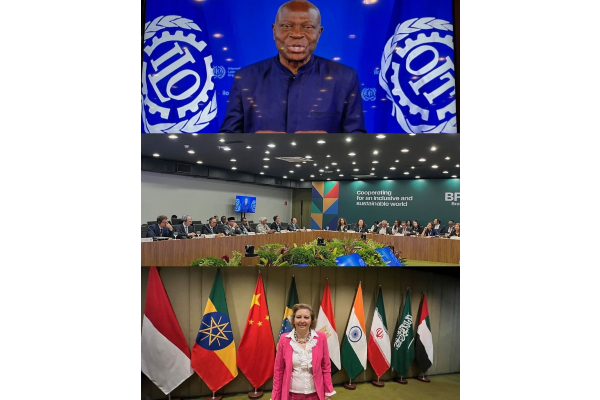
Brasilia, Brazil (ILO News) — On 25 April 2025, at the BRICS Labour and Employment Ministers’ Meeting (LEMM), ILO Director-General Gilbert F. Houngbo called on BRICS countries to take the lead in forging a renewed, socially just future of work. His call comes at a time when labour markets are being profoundly challenged by artificial intelligence (AI) and the transition to more sustainable economies. Mr. Houngbo, who spoke via video message to delegates at the meeting, commended the Brazilian presidency for championing the critical role of South-South and triangular cooperation in helping to navigate the ongoing changes.
“The BRICS Declaration rightly places the future of work, social justice and a just transition at its centre,” said Director-General Houngbo during the opening session. “We face enormous challenges—from AI-driven disruption to the climate crisis—but we also see immense potential. With the right policies, we can turn risk into opportunity, especially in the Global South.”
Underscoring that BRICS countries have “major economies, large workplaces with flagship technology sectors”, Director-General Houngbo emphasized that “BRICS countries have a unique opportunity to shape global standards” adding that “for the stability of our societies, we must leave no one behind.” At the Opening Session, Minister of Labour and Employment Luiz Marinho expressed appreciation for the ILO’s efforts to promote decent work and advance social justice.
Harnessing AI for Decent Work
The ILO’s Assistant Director-General for External and Corporate Relations, Ms. Laura Thompson, who was in attendance and headed the ILO delegation, underscored the DG’s message that AI need not be a force for inequality.
Ms. Thompson emphasized that equitable access to AI “means ensuring that workers have a voice, through meaningful social dialogue, in how AI is used. BRICS countries are uniquely placed to shape the transformations needed regarding the rights-based use of AI at work through South-South cooperation.”
Just Transition: Green Jobs, Inclusive Policies
Ms. Thompson also emphasized the urgent need for a just transition that protects vulnerable workers, particularly those in informal or low-income jobs. The ILO data is stark: 1.2 billion livelihoods are under threat from ecosystem collapse; 2.4 billion workers endure dangerous heat levels; and up to 216 million people could be displaced by climate-related events.
At the same time, clean energy jobs now outnumber those in fossil fuels, and nature-based solutions have the potential to create up to 32 million jobs by 2030, according to ILO findings. The ILO called on BRICS member states to invest in learning and promoting skills development, especially for youth, women, migrants, and informal workers — all of whom are groups at heightened risk of being left behind- to equip them with the knowledge and skills required for such newly created jobs.
Universal Social Protection: A Global Imperative
The LEMM Declaration underlines the growing urgency of universal social protection in a rapidly changing world of work. The protection gap is increasingly widening, including for platform workers with no safety net and the 83% of people living in climate-vulnerable countries that the ILO says lack basic coverage.
“The time has come to rethink social protection for the 21st century,” said Assistant-Director General Thompson. “It must be inclusive, flexible, and portable—especially for migrant workers who power many BRICS economies.”
In his video message, the ILO Director-General commended BRICS countries for innovative national initiatives, such as Brazil’s Brazilian National Service for Industrial Training (SENAI), Russia’s Workforce 4.0, India’s digital skilling, China’s vocational education, and South Africa’s sectoral training authorities. He encouraged the scaling up of these efforts through enhanced South-South cooperation. In this context, the Brazil-ILO South-South cooperation programme “Social Justice for the global South” presents a promising avenue for advancing the priorities outlined by the Labour Ministries.
A Global Coalition for Social Justice
Looking ahead to COP30, which will be hosted by Brazil, the ILO urged BRICS countries to align climate, labour, and social policies into a coherent and transformative and inclusive agenda for men and women around the world. The ILO reaffirmed its commitment to supporting BRICS through the Global Coalition for Social Justice, offering normative guidance, research, and technical cooperation.
“BRICS has a unique opportunity to shift the global narrative—placing decent work, climate justice, and social protection at the heart of sustainable development,” Director-General Houngbo affirmed, concluding that “together, through supportive multilateral efforts, including the Global Coalition for Social Justice, we can ensure that technology serves workers, that climate action creates opportunities, and that both embolden us to secure universal social protection, worldwide.”
The BRICS LEMM was condensed into a single day of intense deliberations on the 25 April, focusing on how BRICS countries can cooperate on AI and just transition. The BRICS ministerial meeting took place in parallel to an ILO-sponsored South-South cooperation event on the same themes. The BRICS countries acknowledged the creation of the BRICS Virtual liaison office and expressed their intention to reinforce it with the establishment of a Social Protection observatory. The LEMM Declaration also takes note of ILO’s work on BRICS productivity and reaffirms support for the promotion of a BRICS productivity platform, which was endorsed during the South African presidency in 2023. The declaration also welcomes the creation of a BRICS Occupational Safety and Health (OSH) Network, which was established during the Russian presidency in 2024. Finally, the ILO engaged in discussions with the Indian delegation regarding India’s upcoming presidency in 2026.
In addition, as part of Brazil’s 2025 BRICS presidency, the ILO and the International Training Centre of the ILO (ITC-ILO) organized an ILO-sponsored event “Emerging Technologies and New Frontiers for Employment for Just Transitions”, which took place in Brasília from 22 to 24 April 2025. The event gathered over 20 experts, government officials, and researchers from BRICS countries to discuss key topics such as AI, automation, big data, biotechnology, and digital platforms. Practitioners from BRICS countries agreed on several concrete proposals and outlined a roadmap for collaborative efforts to ensure a fairer digitalisation of the world of work.
You can watch ILO Director-General Gilbert F. Houngbo’s full video message to the BRICS here.

